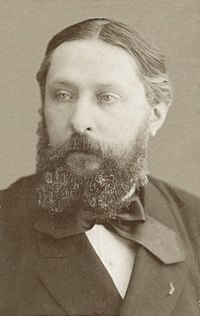René François Armand Sully-Prudhomme
| Sully Prudhomme | |
|---|---|
 |
|
| Born | René François Armand Prudhomme 16 March 1839 Paris, France |
| Died | 6 September 1907 (aged 68) Châtenay-Malabry, France |
| Occupation | Poet and Essayist |
| Nationality | French |
| Notable awards |
Nobel Prize in Literature 1901 |
René François Armand (Sully) Prudhomme (French: [syli pʁydɔm]; 16 March 1839 – 6 September 1907) was a French poet and essayist. He was the first ever winner of the Nobel Prize in Literature in 1901.
Born in Paris, Prudhomme originally studied to be an engineer, but turned to philosophy and later to poetry; he declared it as his intention to create scientific poetry for modern times. In character sincere and melancholic, he was linked to the Parnassus school, although, at the same time, his work displays characteristics of its own.
Prudhomme was born to a French shopkeeper.
Prudhomme attended the Lycée Bonaparte, but eye trouble interrupted his studies. He worked for a while in the Creusot region for the Schneider steel foundry, and then began studying law in a notary's office. The favourable reception of his early poems by the Conférence La Bruyère (a student society) encouraged him to begin a literary career.
His first collection, Stances et Poèmes ("Stanzas and Poems", 1865), was praised by Sainte-Beuve. It included his most famous poem, Le vase brisé. He published more poetry before the outbreak of the Franco-Prussian War. This war, which he discussed in Impressions de la guerre (1872) and La France (1874), permanently damaged his health.
During his career, Prudhomme gradually shifted from the sentimental style of his first books towards a more personal style which unified the formality of the Parnassus school with his interest in philosophical and scientific subjects. The inspiration was clearly Lucretius's De rerum natura, for the first book of which he made a verse translation. His philosophy was expressed in La Justice (1878) and Le Bonheur (1888). The extreme economy of means employed in these poems has, however, usually been judged as compromising their poetical quality without advancing their claims as works of philosophy. He was elected to the Académie française in 1881. Another distinction, Chevalier de la Légion d’honneur, was to follow in 1895.
...
Wikipedia
